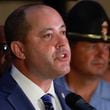NOW SHOWING
“Steve Jobs”
Starring Michael Fassbender, Seth Rogen and Katherine Waterston. Directed by Danny Boyle.
Rated R for language. Check listings for theaters. 2 hours, 2 minutes.
Daniel Kottke knew Steve Jobs before he was Steve Jobs.
It was 1972 when Kottke met the future tech icon at Reed College in Portland, Ore. Both young men shared enthusiasm for Eastern philosophy, Bob Dylan, vegetarianism and LSD. Five years later, Kottke joined Jobs as the 12th employee at a startup called Apple Computer.
Like many others who knew Jobs, Kottke says he doesn’t entirely recognize the version of the Apple co-founder portrayed by Michael Fassbender in the film “Steve Jobs” or the events depicted onscreen.
“It was all complete fiction,” Kottke said last week after watching the movie — which he, nonetheless, enjoyed and admired — at a private screening in Mountain View, Calif. “The film was mythologizing in action. But that’s been going on for quite a while, and Steve cultivated it. The mythology of Steve Jobs has just gone another generation here.”
Written by Aaron Sorkin and directed by Danny Boyle, “Steve Jobs” attempts a tricky balancing act, setting out to convey essential warts-and-all truths about its subject while taking extensive liberties with specific details of his life. The film, which has been in limited release, expands to more than 2,000 theaters Friday.
“Steve Jobs” unfolds backstage at three different product launches, inventing situations and dialogue out of whole cloth and highlighting Jobs’ reputation as a demanding bully and his emotionally fraught relationship with his eldest daughter, Lisa.
On its artistic merits, the film has been met with almost universal raves. But former colleagues and friends of Jobs are judging it by how accurately it depicts the man they knew — and on that score, reactions have been mixed.
By all accounts, Jobs was a complex, mercurial figure, by turns inspirational and tyrannical, visionary and petty. Faithfully representing those paradoxes onscreen in two hours would be a tall order for anyone — and whether or not “Steve Jobs” succeeds depends on who you ask.
Former Apple engineer Andy Hertzfeld, one of the key members of the team that developed the Macintosh, praises the film as “structurally innovative, superbly written and full of great performances.” But he calls its portrayal of Jobs “a caricature.”
“I think it captured Steve’s charisma, ambition, passion, world-class chutzpah and sense of humor really well, but it left out many areas of his personality and distorted others,” said Hertzfeld, who is played in the film by Michael Stuhlbarg. “For example, it mainly showed Steve motivating people by intimidating them, but in real life he more often charmed or inspired them instead.”
Some high-ranking figures within Apple have been harsher in their appraisal.
Apple CEO Tim Cook called the film and other recent movies about Jobs “opportunistic,” while Apple design chief Jony Ive characterized them as a virtual act of posthumous character assassination.
Even before the film went into production, its depiction of Jobs had already raised concerns among a number of his family members and colleagues, including his widow, Laurene Powell Jobs.
Jobs’ high school girlfriend, Chrisann Brennan, whose bitter feud with him over his paternity and financial support of Lisa is one of the film’s main threads, also raised objections to Sorkin’s script early on.
“It was not honest about my character, so I got my attorney involved,” Brennan told The Times in a voicemail message, in which she declined to be interviewed. “Some things were changed. I don’t know what they were. I won’t be able to comment on the movie until after I see it.”
In the end, while Sorkin consulted extensively with Apple co-founder Steve Wozniak, Hertzfeld, Lisa Brennan-Jobs and others, several key figures within Apple refused to be involved with the movie in any way.
“We’ve not had a lot of help from a lot of people,” Boyle said. “Apple is a huge corporation and they like to have control of stuff. That’s why this movie is important: Everybody’s answerable, especially a figure like this.”
For his part, Sorkin — who won the adapted screenplay Oscar for 2010’s “The Social Network” — is not surprised that the film’s provocative depiction of Jobs has stirred up some controversy. But he argues that to subject it to the usual journalistic fact-checking is to miss the point. Unlike with more traditional biopics, he says, its elisions and fabrications are entirely by design.
“We have this conversation every year around this time: ‘Zero Dark Thirty,’ ‘Argo,’ ‘Lincoln,’ Selma,’” Sorkin said. “‘Steve Jobs’ doesn’t fall into the same genre as those films. It’s not meant to be a dramatic re-creation of actual events. Which isn’t to say it’s fiction.
“I believe the movie announces itself pretty quickly as being impressionistic. … I wince a little when I hear ‘artistic license’ because it generally sounds like a dodge — and an excuse for hyping the truth. I don’t think we employed artistic license. I think we were just artistic.”
About the Author





